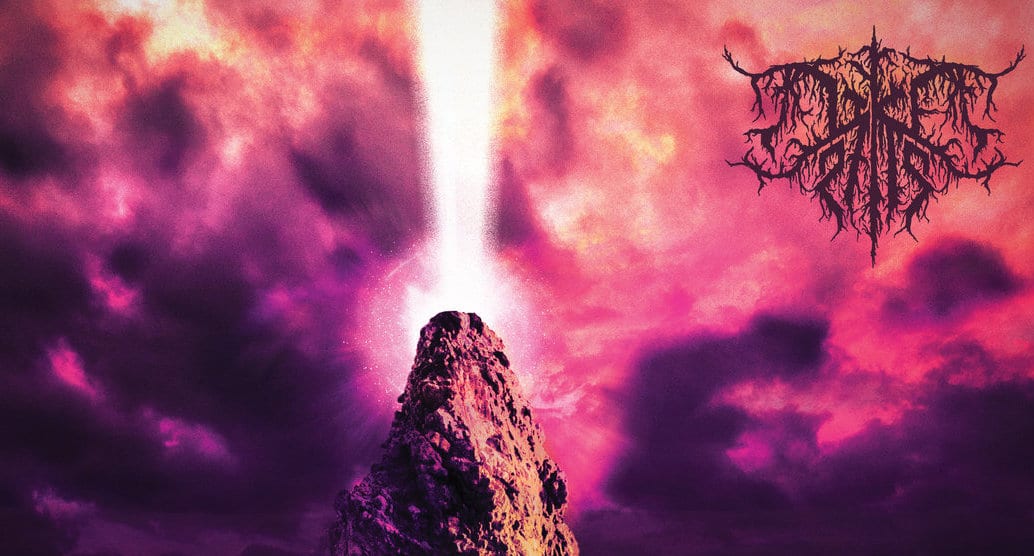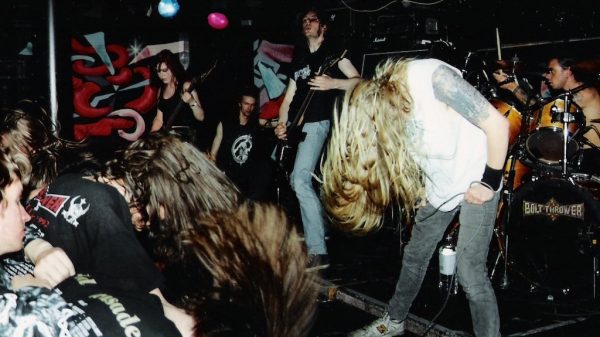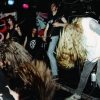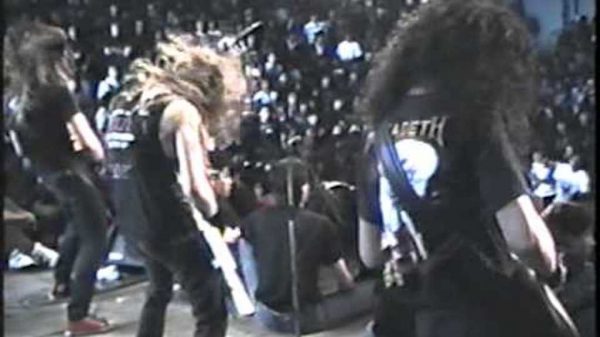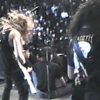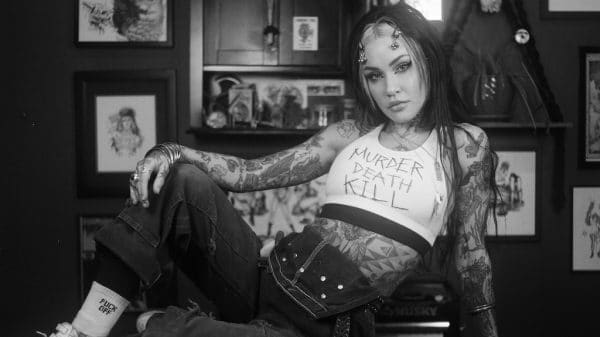Chicago’s Like Rats have been producing tough, compelling death metal since the release of their first EP on Cosmic Debris in 2010. Sharing members with Weekend Nachos and Hate Force, these musicians are experts in hard, angry riffs and darkened worldviews. Ten years after their first release, the group is releasing its monumental third LP, Death Monolith.This album is the greatest expression of what they’ve been writing from the start: powerful, relentless, intelligent Old School Death Metal. Following my review of the album, Todd Nief (with some help from Dan Polak and Andy Nelson) spared some time to answer some of my questions about the album and its creation.
With the great critical and fan reception of your previous releases, what was your mentality in approaching Death Monolith? How has your creative process changed over your years as a band?
Songwriting is always an interesting process since it’s a combination of both picking things out of the ether and purposefully forcing creative output.
Songs come to me in a few different ways:
•Sometimes, a riff or an idea will pop into my head, and then it’s my job to grab a guitar and figure it out or to hum it into a voice memo quickly.
•Sometimes, I have a specific idea or riff that I really like in a song, so I try to extract the principles behind it and recreate my own version of it.
•Sometimes, I have a few different ideas that I want to connect, so I fiddle around with different things and improvise until something starts to make sense.
The process has been similar for every band that I’ve written songs for – but the output always changes. The songs on Death Monolith started as a few different flavors of ideas, but – once the tone of the record started to become clear – we reworked some of the earlier songs so that the music was more cohesive.On past records, we’d purposefully avoided some death metal conventions. However, these riffs and songs were forcing us to embrace things like double bass and tremolo picking – so we went for it.
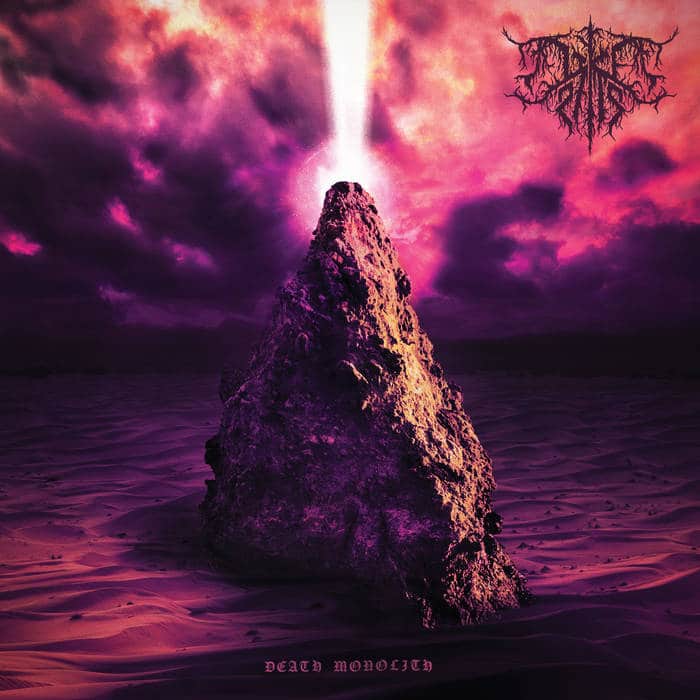
Your releases over the years seem to have drifted away from hardcore toward metal. Does that reflect a change in taste for the band members and/or a change in worldview?
You know, I don’t think we ever really thought of ourselves as a hardcore band. Our early material was much more straight up Celtic Frost worship. Celtic Frost was certainly borrowing from bands like Battalion of Saints and Discharge. And, obviously sharing members with some prominent hardcore bands implies something about our taste and where we’re coming from. However, our influences on Like Rats have always been much more in the “metal” camp. I always wanted to sound like an extreme metal band from 1988 before the various genre tropes of death metal, grindcore, etc. had been fully codified. As mentioned above, you don’t always have control over what comes out when writing. The songs for Death Monolith started to take on many more death metal conventions, and this also allowed us to lean into some of the chromatic melodicism that I really enjoy from albums like Onward to Golgotha and Blessed are the Sick, so it only made sense to embrace that throughout the writing process.
It appears that H. P. Lovecraft and possibly Arthur Machen were influences on the themes of Death Monolith. Is this accurate? What are some other sources of lyrical inspiration? What concepts are the main lyrical focus on Death Monolith, and how did the band decide on how to explore them sonically?
[From Dan]
This is true. These authors gave way to the cosmic horror side of things while I also read and borrow a lot from Jack Kirby and Jim Starlin as they have this wonderful imagination of galaxies and space. Sonically, the songs were written first and fleshed out a while before I had the lyrics, so I just wrote with the general ‘feel’ of the song. Ultimately, what I came up with were similar themes of dealing with forces beyond control in the natural universe and the worship of the unknown. And sometimes it’s appropriate to write about being a celestial being that wants to eat a planet.
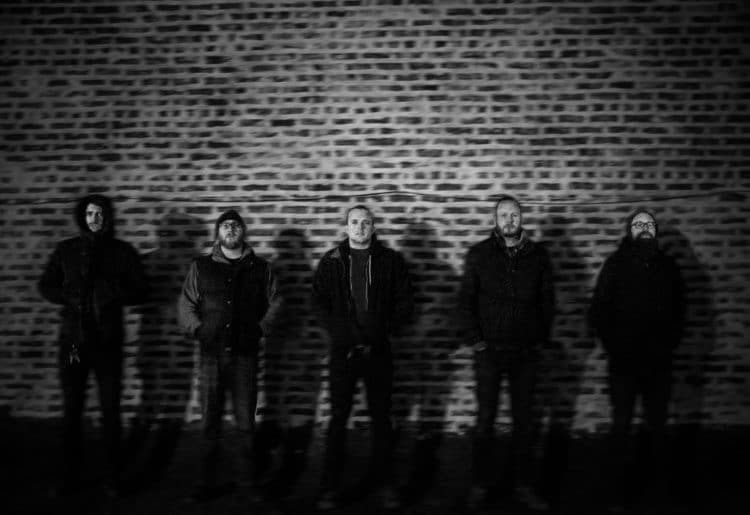
Morbid Angel, Obituary, Celtic Frost, Entombed, and other household Death Metal names seem like they have influenced Like Rats’ sound since the band’s 2010 EP. What are some less obvious influences? Is Death Monolith influenced by any artists that the previous releases weren’t?
If you want a playbook on how we wrote Death Monolith, these four albums pretty much cover it:
Celtic Frost – To Mega Therion
Incantation – Onward to Golgotha
Morbid Angel – Blessed are the Sick
Sepultura – Beneath the Remains
We both purposefully “borrowed” ideas and riffs from these records – and have had our subconscious understanding of how to craft a metal song shaped by them from years of listening. Even though it may sound like it to a listener, I don’t think the influences on Like Rats have changed too much over the years. In terms of less obvious influences, we are also heavily influenced by the neo-classical composers’ abilities to craft melody through chromaticism and dissonance. We were influenced both tangibly and subconsciously by Sergei Prokofiev, Arvo Pärt, and Igor Stravinsky.
Drew and Todd also play in Hate Force with James Pligge of Harm’s Way and Few And The Proud (which also featured Drew). When writing, how do you decide which songs to develop for which project?
Different projects have a different “feel,” and that “feel” guides the composing process. For Like Rats, I am the primary songwriter, whereas Drew is the primary songwriter for Hate Force. If I’m writing something for Hate Force, I’m attempting to write “in the style” of what Drew has already established for that band. Hate Force is more rhythmic and percussive, so I’m thinking about Asphyx, Unleashed, and Bolt Thrower when writing. Like Rats is more melody focused and more “convoluted,” so I focus more on establishing themes and varying them throughout a song. Some of it is also just curation in terms of allocating ideas appropriately to different projects. Like, if you have a riff pop into your head, you sort of know where that riff “belongs.”
All of Like Rats’ releases have been recorded at Chicago’s Bricktop Recording, which is run by Pete Grossman and Like Rats’ bassist Andy Nelson. How does having Andy in the band and at the boards affect the band dynamic?
[From Andy Nelson]
Actively playing music and being a recording engineer has a pretty profound impact on my experience as a band member. As soon as riffs start coming together, I’m already imagining what it will be like coming through the studio monitors. It’s easier to identify problems early on, like if a part is the wrong tempo or if certain patterns repeat too much. It’s also very exciting to be working on a song in the rehearsal room and knowing how sick it will sound once recorded and playing in my car. It becomes a feedback loop of real-time excitement and future excitement about the end product. I’m very fortunate to not only have great players in the band, but people who trust me and give me a lot of control over the sonic qualities of the record. There is some additional pressure to do the best work I can, but that’s at least partially offset by the flexibility of having access to a great studio. Schedule allowing, we can spend as much time as need to make sure we’re happy with the results. There was a lot of demoing and revising throughout the writing and recording process of this record and I think it shows.
How would you describe the metal and hardcore scene in Illinois at the moment? Are there local bands that deserve more national attention?
There are lots of really good bands in Chicago, but I can’t say that it feels like much of a scene. I’d love to change that, since there’s an obvious benefit to everyone playing extreme music to work together. In terms of newer metal bands that deserve national attention, both Nucleus and Molder are incredible. The mighty Cianide is also still criminally underrated. Their newest EP ranks as one of their best releases in an already incredible discography. Like Rats also shares members with Thin Lizzy- and Black Sabbath-worshippers High Priest. For more stoned riffs, check out Blunt and REZN. In terms of hardcore bands, I think Harm’s Way probably already has people’s attention, but those guys are doing something really smart and challenging, and I think a lot of people have unfairly pegged them as “oh yeah the band with the singer who works out.” Also, perennial grind favorites Sea of Shit and Sick/Tired are both still going strong. For some strange punk, check out LURK. For non-metal and hardcore: Dead Rider (ex US Maple – like nothing you’ve heard before), Sourmouth (for fans of Oasis and The Lemonheads – members of Like Rats). Makaya McCraven is one of the best drummers in the world. Joshua Abrams & Natural Information Society (for fans of Phillip Glass, minimalist Krautrock, and other ambient delights).
Todd, you are Lead Coach at the South Loop Strength and Conditioning CrossFit gym and you run a blog and podcast. How do you balance these activities, and how do they complement one another?
You know, I don’t even necessarily think of it as “balancing.” I have a lot of things that I’m interested in, and I feel like I struggle to properly attend to all of them at any given time. Running a small business is one of the most challenging things I’ve ever done, and that occupies most of my time. We have several full-time employees, so I’m less “in the weeds” of coaching now, but – as with most jobs – I now spend a lot of time writing software, sending emails, and running meetings.
In terms of running a blog and podcast, I’ve always been someone who is very opinionated on a lot of topics, and I’ve also always felt compelled to share my opinions on those topics. Doing so through a blog and a podcast seems like the natural extension of my high school behavior of sneaking into the school copy room after hours to print copies of our shitty zine that we then distributed in the hallways. The podcast also allows me an excuse to reach out to interesting people and convince them to talk to me about their ideas. I really enjoy the process of challenging my thinking and learning about diverse topics in fitness, music, science, etc. I also recognize that I’m sort of hamstringing myself in terms of audience growth by not focusing on one of those topics, but I kind of don’t care. I have diverse interests and an obsessive tendency to seek out and learn about things that I care about. If anyone else gets benefit from the conversations, I’m thrilled about it.
In terms of crass self-promotion, here’s some episodes that the Cvlt audience may enjoy:
Following the exciting response about singles “World Devourer,” “Foul Wind,” and “Crimson Cosmos,” what do you want fans to know about Death Monolith before they hear it in full?
Only Death Monolith is Real

Death Monolith is out April 10 through Hibernation Release.

